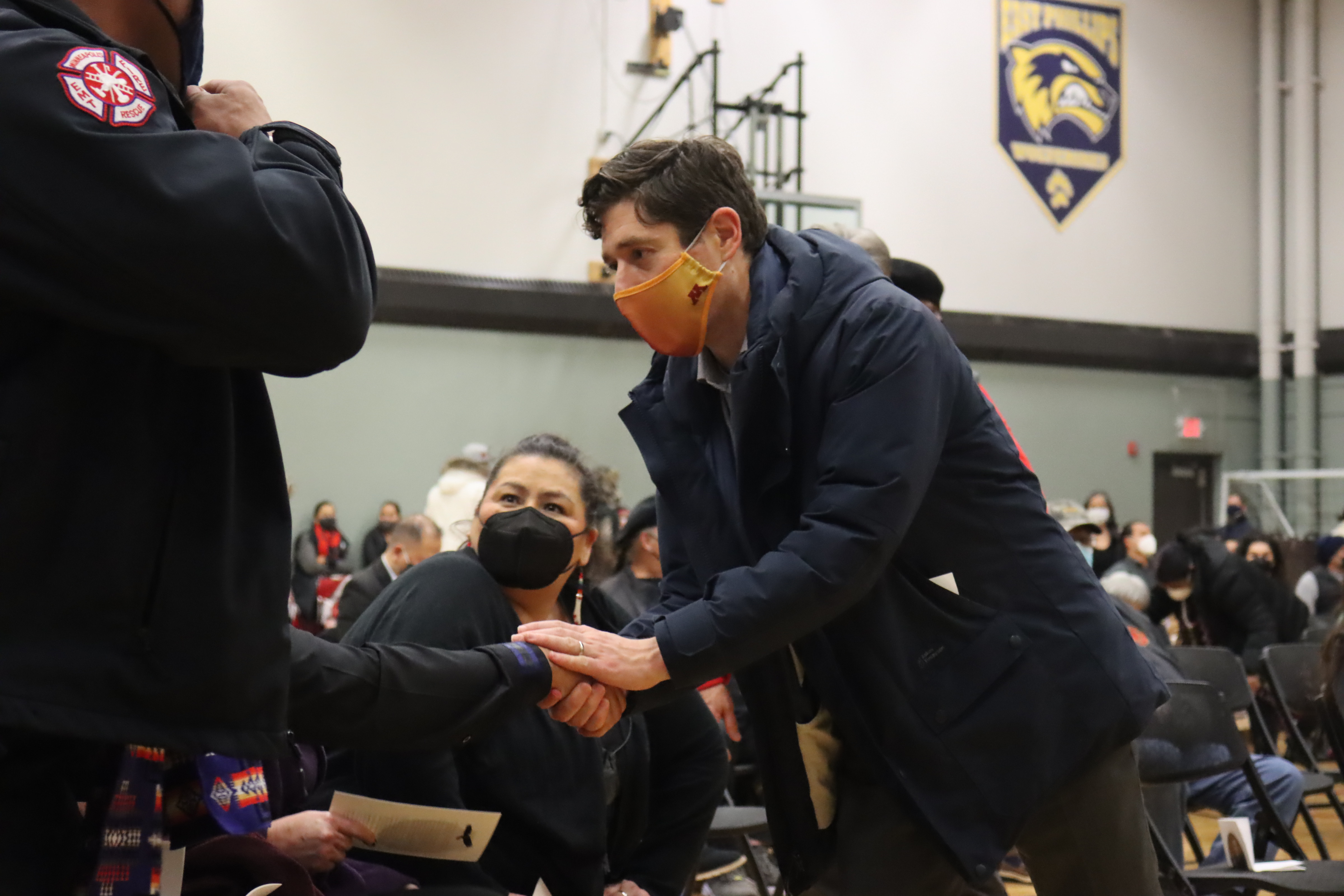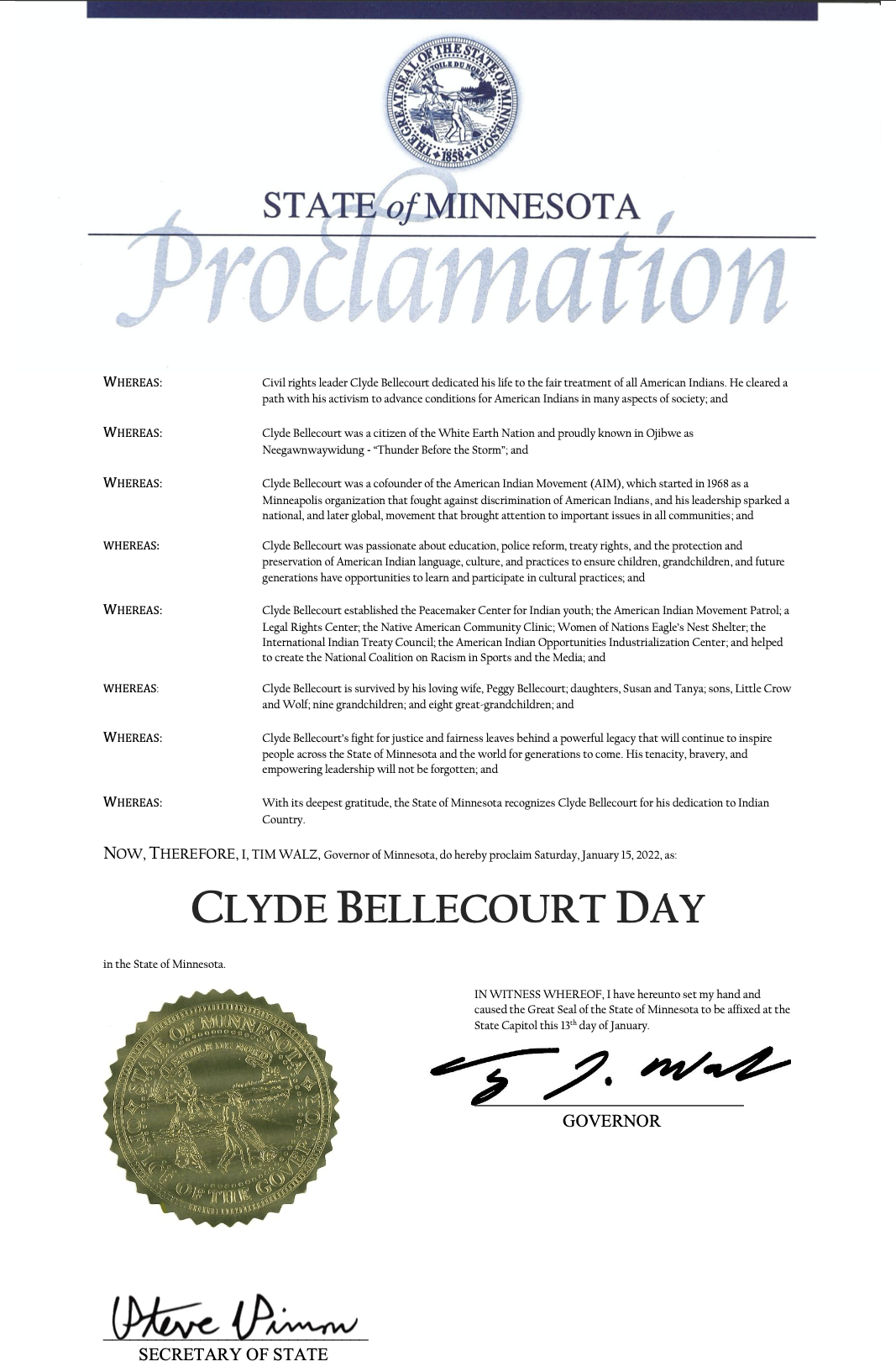
- Details
- By Darren Thompson
MINNEAPOLIS — Leaders and hundreds of supporters attended the wake service Thursday evening for Clyde Bellecourt (White Earth Ojibwe), one of the original founders of the American Indian Movement (AIM) who passed away on Tuesday morning due to complications with cancer. He was 85.
The wake service for Clyde Bellecourt began for the general public at 7:00 pm at the East Phillips Park Cultural & Community Center on Minneapolis’s Southside, near the Little Earth neighborhood. A wake service is also scheduled for Friday evening on the White Earth Indian Reservation followed by a traditional Ojibwe funeral service and burial Saturday morning.
Community leaders spoke of Bellecourt’s bravery and tenacity to fight for causes not popular to society.
“He talked about what it was to be brave, to be bold, to fight for what you want no matter what they do to you,” said community leader Spike Moss during Thursday’s services.
Minneapolis Mayor Jacob Frey spoke of his presence at City Hall.
 “There are few people that leave such a mark where you remember every single interaction you’ve had with them,” said Minneapolis Mayor Jacob Frey of Clyde Bellecourt during his wake service on Thursday evening. “Clyde had that charisma and persona and his presence was always preceded by drum beats when he entered City Hall.”
“There are few people that leave such a mark where you remember every single interaction you’ve had with them,” said Minneapolis Mayor Jacob Frey of Clyde Bellecourt during his wake service on Thursday evening. “Clyde had that charisma and persona and his presence was always preceded by drum beats when he entered City Hall.”
More than 300 people attended the wake service to pay their final respects to Bellencourt, who was one of the original founders of AIM and a well-known community leader. Founded in 1968 in Minneapolis, AIM would eventually gain international attention for protesting against the conditions many American Indians faced in society including police brutality, discrimination in employment and housing, and many other issues.
Minnesota Lieutenant Governor Peggy Flanagan, also a White Earth Band of Ojibwe tribal citizen, presented a proclamation from the Minnesota Governor’s Office declaring Saturday, January 15 as Clyde Bellecourt Day. “His tenacity, bravery and empowering leadership will not be forgotten,” said Minnesota Lieutenant Governor Peggy Flanagan during the wake service on Thursday evening.
“With its deepest gratitude, the State of Minnesota recognizes Clyde Bellecourt for his dedication to Indian Country,” reads the proclamation.
Clyde Bellecourt established the Peacemaker Center for Indian youth, the American Indian Movement patrol, a legal rights center, the Native American Community Clinic, Women of Nations Eagle’s Nest Shelter, the International Indian Treaty Council, the American Indian Opportunities Industrialization and helped create the National Coalition on Racism in Sports and the Media.
Clyde Bellecourt is survived by his wife Peggy, his sister Judy, his children Susie, Tanya, Crow, and Wolf, as well as many nieces, nephews, grandchildren, friends, and relatives.
More Stories Like This
Native News Weekly (August 25, 2024): D.C. BriefsUS Presidents in Their Own Words Concerning American Indians
Native News Weekly (December 14, 2025): D.C. Briefs
Wounded Knee Massacre Site Protection Bill Passes Congress
Two Murdered on Colville Indian Reservation
Help us defend tribal sovereignty.
At Native News Online, our mission is rooted in telling the stories that strengthen sovereignty and uplift Indigenous voices — not just at year’s end, but every single day.
Because of your generosity last year, we were able to keep our reporters on the ground in tribal communities, at national gatherings and in the halls of Congress — covering the issues that matter most to Indian Country: sovereignty, culture, education, health and economic opportunity.
That support sustained us through a tough year in 2025. Now, as we look to the year ahead, we need your help right now to ensure warrior journalism remains strong — reporting that defends tribal sovereignty, amplifies Native truth, and holds power accountable.
 The stakes couldn't be higher. Your support keeps Native voices heard, Native stories told and Native sovereignty defended.
The stakes couldn't be higher. Your support keeps Native voices heard, Native stories told and Native sovereignty defended.
Stand with Warrior Journalism today.
Levi Rickert (Potawatomi), Editor & Publisher
